LGBT

For more than a generation, the gay conversion organization known as Exodus International has been one of the most prominent Christian symbols of LGBT intolerance. They have practiced what is commonly called “reparative therapy” to supposedly remove the urges of same-sex attraction from those who seek to become straight. I have personally written at great length about the damage done by such religiously fueled zealotry, but never in my lifetime did I anticipate that the leader of this infamous anti-gay organization would concede as much to the public in the form of a confession.
What’s more, at their 38th annual convention, Exodus International’s director, Alan Chambers, announced plans to close the organization and cease its mission for good. You can read Mr. Chambers’ full of apology HERE, as well as the formal closure announcement HERE.
I’m not prone to emotional hyperbole, but I read these announcements and confessions with a nearly overwhelming admixture of shock, disbelief, compassion, and hope. I also try not to fill my blog posts with too much content from other sources, but this is one of those occasions when the original source material should be seen without adaptation. Following are several excerpts for Mr. Chambers’ open apology to the public, along with my thoughts:
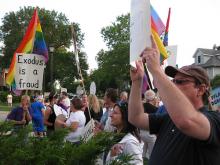
Exodus International, a group that bills itself as “the oldest and largest Christian ministry dealing with faith and homosexuality,” announced late Wednesday that it’s shutting its doors.
Exodus’s board unanimously agreed to close the ministry and begin a separate one, though details about the new ministry were unavailable at the time of the organization’s press release.
The announcement came just after Exodus president Alan Chambers released a statement apologizing to the gay community for many actions, including the organization’s promotion of efforts to change a person’s sexual orientation.

Daily Show correspondent Samantha Bee's latest segment for the late-night comedy show took on the perception in some religious circles that Christians are the ones being targeted by the LGBT community. She sits down with pastor and Christian radio-show host Matt Slick to explore his fear of infringement of his religious liberty.
"At what point has your right to express yourself been infringed upon?" Bee asked in the interview.
Slick's response: "I don't know if it's going to happen, but I'm concerned about it. I have a radio show. I'm just concerned about any oppression that may come, that people might say, 'Matt, you can say that on the radio, that homosexuality is a sin.'"

We all know that when it comes to the acceptance of LGBT folks, religions differ. But what the religions communicate, and how the people in the pews actually feel, are not the same.
In a word, the rank and file tend to be more accepting than the leadership. What’s striking is how much this LGBT Gap varies from religion to religion, and we can get some idea of the variance from Pew’s new survey of LGBT Americans.
As the measure of institutional messaging, we will use the percentages of LGBT people who say a given religion is unfriendly to them. These range from 84, 83, 79, and 73 percent for Islam, Mormonism, Catholicism, and Evangelicalism to 47 and 44 percent for Judaism and Mainline Protestantism. Then there is the proportion of members of each religion who believe that “homosexuality should be discouraged by society.” That’s 45, 65, 20, and 59 percent for the first four groups; 15 and 26 percent for the last two.
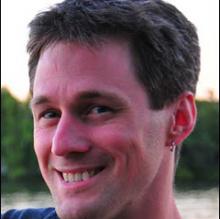
Gay Americans are much less religious than the general U.S. population, and about 3-in-10 of them say they have felt unwelcome in a house of worship, a new study shows.
The Pew Research Center’s study, released Thursday, details how gay, lesbian, bisexual, and transgender Americans view many of the country’s prominent faiths: in a word, unfriendly.
The vast majority said Islam (84 percent); the Mormon church (83 percent); the Roman Catholic Church (79 percent); and evangelical churches (73 percent) were unfriendly. Jews and nonevangelical Protestants drew a more mixed reaction, with more than 40 percent considering them either unfriendly or neutral about gays and lesbians.
TWO YEARS AGO, Jeff Chu found himself at a crossroads. Like many gay Christians, he felt disconnected—condemned by a wide swath of his fellow believers because of his sexual orientation, questioned because of his faith by some in the LGBTQ community who have been pushed out of the church by the words and actions of many Christians. To top it off, there was that lingering doubt, so common among those raised in evangelical households: Does Jesus really love me?
To answer that question, Chu—an award-winning writer for Time, The Wall Street Journal, andCondé Nast Portfolio and the grandson of a Southern Baptist preacher—took off on a yearlong cross-country pilgrimage, “asking the questions that have long frightened me.” What he encountered was a divided church, “led in large part by cowardly clergy who are called to be shepherds yet behave like sheep.”
Many of the pastors Chu contacted for the book refused to speak with him, citing their suspicion of him as a member of the so-called “‘liberal media elite’” or stating bluntly that engaging on such a controversial issue might jeopardize funding for a pet project. After speaking with Richard Land, then-president of the Ethics & Religious Liberty Commission of the Southern Baptist Convention, and David Shelley, a Baptist minister from Tennessee affiliated with the Family Research Council, Chu concludes that they “devote much more time talking about legislation than about love.”
Then there are those he interviewed who are known more for screaming than talking. In meeting with members of the infamous Westboro Baptist Church, Chu does not shy away from controversy—or his own fears. “Some nights before my departure,” he recalls of the days before his trip to Kansas, “I had nightmares, and many mornings I’d wake with my jaw tight and teeth clenched.” His encounter with Rev. Fred Phelps, the grizzled, homophobic pastor of the church, is perhaps the most riveting of the book, culminating in a surreal, grudging offer of friendship from Phelps.

I’VE WINCED often at the portrayal of religion in recent documentaries—partly out of embarrassed identification with some of the apparently crazy things I’ve witnessed in real life, and partly because some documentarians seem to think that there’s nothing to religion other than those crazy things. God Loves Uganda, a new documentary about the role played by U.S. missionaries in nurturing that country’s homophobic culture and legislation, manages to avoid the mistake of confusing bad religion with all religion.
The concern for the Ugandan people manifested by fundamentalist charismatic Christians is suggested to be far less than the sum of its parts as they become participants in the nurturing of a social structure that aims to eradicate gay people. But the film avoids easy stereotyping of Christian mission work, particularly in the person of Bishop Christopher Senyonjo, a smiling radical in the mold of Desmond Tutu. His is a face of Ugandan Christianity that is open, generous, alive, courageous, and kind—a prophetic African voice for human rights.
Wendell Berry recently suggested that the expression of anti-LGBTQ sentiment may evoke a kind of subconscious reaction in the proponent akin to autoerotic pleasure. Delighting in the pain of others is a kind of sadism rooted in the insecurities harbored by the person who has decided it’s their job to be the moral police, despite how kind they may think they are being. The fear stirred by psuedo-Dominionist movements may have given the U.S. missionaries in God Loves Uganda a sincere desire to change the world. But their lack of self-reflection leads them to export some of the worst of American cultural imperialism: prejudice, the conflation of sentimentality and cultural ignorance with love, the denial of the gift that the other has for us.
WITH TROUBLING DIVORCE RATES, the trend among younger couples to postpone marriage or abstain from it altogether, and other factors, some feel we are in danger of losing marriage in this society. The institution is arguably in serious trouble.
This period of intense media focus on marriage—while more and more states legally affirm marriage equality and the Supreme Court ponders two related cases—offers the opportunity to examine the institution of marriage itself. How can we strengthen and support marriage, a critical foundation of a healthy society? How can we, as church and society, encourage the values of monogamy, fidelity, mutuality, loyalty, and commitment between couples?
A study by the Barna Research Group a few years ago found that “born again Christians are more likely than others to experience a divorce,” a fact that pollster George Barna said “raises questions regarding the effectiveness of how churches minister to families.” Our authors in this issue wrestle with what it takes to build long-lasting marriages, rooted in and offering a witness to God’s covenantal love. —The Editors
MY HUSBAND AND I have been married to each other for 42 years. Does this make me an expert on heterosexual marriage? Not really.
My experience over 40 years as a pastor, teacher, and theologian helps some in thinking about marriage, as I have counseled couples and performed countless weddings, in addition to my personal experience. But as a contextual theologian of liberation, I know that to extrapolate from your own experience, or even from that of a small group, means you end up colonizing other people’s experiences through ideological privilege. In short, what that means is you think you know more than you really do. Hence, using social, political, and economic analysis is crucial if we are to think theologically in context about marriage.
A couple of things seem clear, however. Marriage, in all its manifestations, is going through tremendous change in our society, and marriage as a social and political institution, and as a religious practice, needs strengthening.
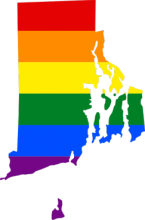
WASHINGTON — Rhode Island on May 2 became the 10th state to approve same-sex marriage, and the Delaware Legislature holds a key vote on May 9 on the same issue. But Brian Brown, president of the National Organization for Marriage, denies there is a national tide in support of marriage rights for gay couples.
“I don’t know that I would say Rhode Island is a trend,” Brown said, also questioning victories for supporters of gay marriage initiatives in Maine, Maryland, and Washington state last November.
“Again, we’re talking about states that are not necessarily indicative of the rest of the country. These are pretty deep-blue, liberal states we’re talking about.”
Even so, Brown, the head of the leading national organization opposing same-sex marriage, finds himself playing defense as more Americans support same-sex marriage and more state legislatures debate measures authorizing it.
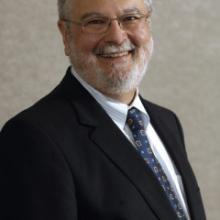
Conservative and liberal religious leaders may not agree on much, but both are expressing displeasure with the Boy Scouts’ proposal to accept gay members but reject gay leaders.
The Boy Scouts of America released its draft proposal on April 19 that will be voted on at its annual meeting in May.
“No youth may be denied membership in the Boy Scouts of America on the basis of sexual orientation or preference alone,” reads the proposed resolution, which also notes that the Scouts “will maintain the current membership policy for all adult leaders of the Boy Scouts of America.”
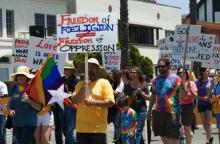
The notion of religious liberty has lately conveyed an impoverished attitude toward the common good among Christians. Namely, “we’ll pay for what we like, and won't pay for what we don’t.”
This stubbornness cropped up last week in College Station, Texas, when the student senate at Texas A&M voted for students to have the privilege of diverting tuition payments from services they object to on moral grounds. Named the “Religious Funding Exemption Bill,” the broadened proposal’s original language (“GLBT Funding Opt Out Bill”) specifically targeted funds going to the campus’ GLBT Resource Center.
Missing from the media coverage was a real look at the bill’s usage of religious exemption — or more specifically, its misuse. In its bill, the student government at A&M confused religious liberty with religious control, and managed to do a good degree of community damage in the process.
DR. JAMES BROWNSON'S book Bible, Gender, Sexuality: Reframing the Church's Debate on Same-Sex Relationships calls us all into a deeper engagement with the Bible itself, exploring in the most thoughtful and thorough ways not just what it says but, more important, what these inspired words of revelation truly mean.
On the one hand, Brownson argues that many of those upholding a traditional Christian view of same-sex relationships have made unwarranted generalizations and interpretations of biblical texts that require far more careful and contextual scrutiny. On the other hand, those advocating a revised understanding often emphasize so strongly the contextual and historical limitations of various texts that biblical wisdom seems confined only to the broadest affirmations of love and justice.
For all, Brownson invites us into a far more authentic, creative, and probing encounter with the Bible as we consider the ethical questions and pastoral challenges presented by contemporary same-sex relationships in society and in our congregations. In so doing, Brownson does not begin by focusing on the oft-cited seven biblical passages seen as relating to homosexuality. Rather, he starts by examining the underlying biblical assumptions made by those holding to a traditional view, and dissecting the undergirding perspectives held by those advocating a revised view.
THE CHURCH IS locked in a polarized debate around same-sex relationships that is creating painful divisions, subverting the church's missional intent, and damaging the credibility of its witness. We've all heard the sound-bite arguments. For some, condoning or blessing same-sex relationships betrays the clear teaching of the Bible, and represents a capitulation to the self-gratifying, permissive sexual ethic of a secularized culture. For others, affirming same-sex relationships flows from the command to love our neighbor, embodies the love of Jesus, and honors the spiritual integrity and experience of gay and lesbian brothers and sisters.
The way the debate presently is framed makes productive dialogue difficult. People talk past one another. Biblical texts collide with the testimony of human experience. The stakes of the debate become elevated from a difference around ethical discernment to the preservation of the gospel's integrity—for both sides. Lines get drawn in the ecclesiastical sand. Some decide that to be "pure" they must separate themselves spiritually from others and break the fellowship of Christ's body. Then the debate devolves into public wrangling over judicial proceedings, constitutional interpretations, and property ownership. Meanwhile, the "nones," those who are walking away from any active relig-ious faith, find further confirmation for their growing estrangement.
Mirroring the dynamics of contemporary secular politics, the debate is driven by small but vocal minorities with uncompromising positions at one end or another of the spectrum. For the majority in the middle, who may be unclear about their own understandings, exploring their questions is made difficult because of the polarized toxicity of the debate. Further, those in positions of leadership in congregations or denominations come to regard the controversy over same-sex relationships as the "third rail" of church politics. They don't want to touch it. I know this because I've been there myself.
WHO SHOULD BE able to pray at a presidential inauguration and what should that prayer be?
On Jan. 20, 1937, Monsignor John A. Ryan delivered the first inaugural benediction at the inauguration of Franklin D. Roosevelt with these words: "Almighty God, ruler of nations, we beseech thee to bless the people of the United States. Keep them at peace among themselves and in concord with all other peoples. Cause justice and charity to flourish among them, that they may all be enabled to live as persons created in thine own image and likeness."
Since this first benediction, ministers, priests, bishops, cardinals, and rabbis have offered prayers at the past 18 presidential inaugurations. Almost 76 years to the day since Father Ryan's benediction, Myrlie Evers-Williams became the first layperson to deliver the inaugural invocation, and Rev. Luis León, an Episcopal priest, offered his prayer for President Obama and our nation: "... with the blessing of your blessing, we will see that we are created in your image, whether brown, black, or white, male or female, first-generation immigrant American or daughter of the American Revolution, gay or straight, rich or poor ... with your blessing we will recognize the abundance of the gifts of this good land with which you have endowed this nation."
You may remember that the selection of Rev. León, like most decisions made in Washington today, did not come without controversy and an onslaught of protests. León, who ministers at St. John's Church near the White House and is known for welcoming openly gay Christians, replaced the administration's first choice, Rev. Louie Giglio. Giglio withdrew from the ceremony after the surfacing of his controversial sermon from 20 years ago condemning gay relationships. Giglio's stance on the issue of gay marriage is in sharp contrast to the beliefs of Rev. León, whose parish will begin to bless same-sex partnerships and ordain transgender priests this summer.
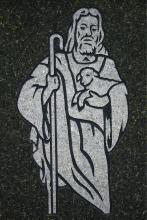
WHEN POPE BENEDICT XVI unexpectedly announced his resignation in mid-February, many expressed admiration for the decision's honesty and humility, and much speculation followed about the reasons for it—and the consequences it would have.
As transition takes shape in the Vatican, Catholics around the world are commemorating the 50th anniversary of the Second Vatican Council, which took place from 1962 to 1965 and which redefined the church's relationship to the world. Vatican II's final document said: "This council can provide no more eloquent proof of its solidarity with, as well as its respect and love for the entire human family with which it is bound up, than by engaging with it in conversation about these various problems," referring in part to the "profound and rapid changes ... spreading by degrees around the whole world." Half a century ago, few could have predicted the dramatic changes that were to follow in science, technology, global integration, and social mores.
Catholics know that in the last 50 years the institutional church has been at the forefront of calls for a more just, compassionate, and sustainable world. Catholic social and ecological teaching is well developed and clearly articulated. The church has offered analysis and challenging proposals for financial reform, arms control, care for creation, and multilateral political structures of accountability in response to globalization.
We want the new pope to continue, deepen, and make much more visible—including to Catholics around the world—the church's prophetic work for social and economic justice, for environmental sustainability, and for wise, just, and inclusive peace. We want the new pope to engage the Islamic world, respectfully cooperating in response to orchestrated fear, enemy-making, and all forms of religious extremism. We want him to promote cultures of peace in a world that is increasingly violent. We want him to be open to new cosmological insights that are transforming human consciousness; shifting our understanding of earth community and of our planet's place in the vast, expanding universe; and maturing our reflections on the One who is Creator, Incarnation, and Spirit of love.
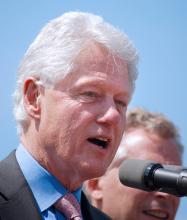
It’s not every day you see an ex-president ask the Supreme Court to strike down a law he signed.
The justices must decide whether the Defense of Marriage Act “is consistent with the principles of a nation that honors freedom, equality and justice above all, and is therefore constitutional,” Clinton writes in The Washington Post.
Bio: Executive director of Sexual Minorities Uganda, which works for full legal and social equality in the country, and recipient of the 2011 Robert F. Kennedy Human Rights Award. www.sexualminoritiesuganda.net
1. What’s your response to the letter U.S. religious leaders signed last year, which condemned the “Anti-Homosexuality Bill” before Uganda’s Parliament because it “would forcefully push lesbian, gay, bisexual, and transgender (LGBT) people further into the margins”?
Uganda is a very Christian country. About 85 percent of our population is Christian—Anglican, Catholic, and Pentecostal. So for religious leaders to speak out against the Ugandan legislation, that is very important for me and for my colleagues in Uganda, because it speaks not only to the politicians and legislators, but also to the minds of the ordinary citizens.
It is very important to have respected religious leaders involved, including Archbishop Desmond Tutu, because these are leaders who have spoken out on other human rights issues such as apartheid, women’s rights, and slavery. And for us, for the voice of LGBT rights, to join with these other issues clearly indicates that our movement is fighting for human rights.
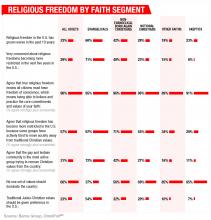
WASHINGTON — Half of Americans worry that religious freedom in the U.S. is at risk, and many say activist groups — particularly gays and lesbians — are trying to remove “traditional Christian values” from the public square.
The findings of a poll published Wednesday reveal a “double standard” among a significant portion of evangelicals on the question of religious liberty, said David Kinnaman, president of Barna Group, a California think tank that studies American religion and culture.
While these Christians are particularly concerned that religious freedoms are being eroded in this country, “they also want Judeo-Christians to dominate the culture,” said Kinnamon.
“They cannot have it both ways,” he said. “This does not mean putting Judeo-Christian values aside, but it will require a renegotiation of those values in the public square as America increasingly becomes a multi-faith nation.”
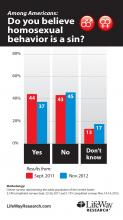
Americans’ acceptance of gays and lesbians is continuing to grow, with a new poll showing that just over a third of Americans view homosexuality as a sin, down from 44 percent a year earlier.
The finding from LifeWay Research, which was founded by the Southern Baptist Convention, was released just as the pastor who was to give the inaugural benediction for President Barack Obama withdrew from the program over an anti-gay sermon he gave 20 years ago.

NAIROBI, Kenya — Nobel Laureate Archbishop Desmond Tutu on Tuesday urged Uganda to scrap a controversial draft law that would send gays and lesbians to jail and, some say, put them at risk of the death penalty.
The Anti-Homosexuality Bill is expected to become law after Parliamentary Speaker Rebecca Kadaga offered it to Ugandans as a "Christmas gift." The bill is believed to exclude the death penalty clause after international pressure forced its removal, but gay rights activists say much of it is still horrendous.
“I am opposed to discrimination, that is unfair discrimination, and would that I could persuade legislators in Uganda to drop their draft legislation, because I think it is totally unjust,” Tutu told reporters here on Tuesday at the All Africa Conference of Churches meeting.